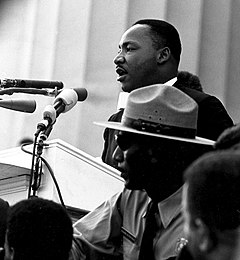
Back لدي حلم Arabic Mənim bir arzum var Azerbaijani بیر رویام وار AZB У мяне ёсць мара Byelorussian Имам една мечта Bulgarian I Have a Dream BS Tinc un somni Catalan I Have a Dream Czech I Have a Dream Danish I Have a Dream German

| External audio | |
|---|---|
"I Have a Dream" is a public speech that was delivered by American civil rights activist and Baptist minister[2] Martin Luther King Jr. during the March on Washington for Jobs and Freedom on August 28, 1963. In the speech, King called for civil and economic rights and an end to racism in the United States. Delivered to over 250,000 civil rights supporters from the steps of the Lincoln Memorial in Washington, D.C., the speech was one of the most famous moments of the civil rights movement and among the most iconic speeches in American history.[3][4]
Beginning with a reference to the Emancipation Proclamation, which declared millions of slaves free in 1863,[5] King said "one hundred years later, the Negro still is not free".[6] Toward the end of the speech, King departed from his prepared text for a partly improvised peroration on the theme "I have a dream", prompted by Mahalia Jackson's cry: "Tell them about the dream, Martin!"[7] In this part of the speech, which most excited the listeners and has now become its most famous, King described his dreams of freedom and equality arising from a land of slavery and hatred.[8]
Jon Meacham writes that, "With a single phrase, King joined Jefferson and Lincoln in the ranks of men who've shaped modern America".[9] The speech was ranked the top American speech of the 20th century in a 1999 poll of scholars of public address.[10] The speech has also been described as having "a strong claim to be the greatest in the English language of all time".[11]
- ^ "Special Collections, March on Washington, Part 17". Open Vault. at WGBH. August 28, 1963. Archived from the original on December 26, 2018. Retrieved September 15, 2016.
- ^ Cite error: The named reference
MKNYTwas invoked but never defined (see the help page). - ^ Hansen, D. D. (2003). The Dream: Martin Luther King Jr. and the Speech that Inspired a Nation. New York: Harper Collins. p. 177. OCLC 473993560.
- ^ Tikkanen, Amy (August 29, 2017). "I Have a Dream". Encyclopædia Britannica. Archived from the original on October 20, 2018. Retrieved May 7, 2019.
- ^ Echols, James (2004), I Have a Dream: Martin Luther King Jr. and the Future of Multicultural America.
- ^ Alexandra Alvarez, "Martin Luther King's 'I Have a Dream': The Speech Event as Metaphor", Journal of Black Studies 18(3); doi:10.1177/002193478801800306.
- ^ See Taylor Branch, Parting the Waters: America in the King Years 1954–1963.
- ^ Cite error: The named reference
Millswas invoked but never defined (see the help page). - ^ Meacham, Jon (August 26, 2013). "One Man". Time. p. 26.
- ^ Lucas, Stephen; Medhurst, Martin (December 15, 1999). "I Have a Dream Speech Leads Top 100 Speeches of the Century". University of Wisconsin–Madison. Archived from the original on February 10, 2016. Retrieved July 18, 2006.
- ^ O'Grady, Sean (April 3, 2018). "Martin Luther King's 'I Have a Dream' speech is the greatest oration of all time". The Independent. Archived from the original on January 28, 2021. Retrieved December 19, 2020.
© MMXXIII Rich X Search. We shall prevail. All rights reserved. Rich X Search